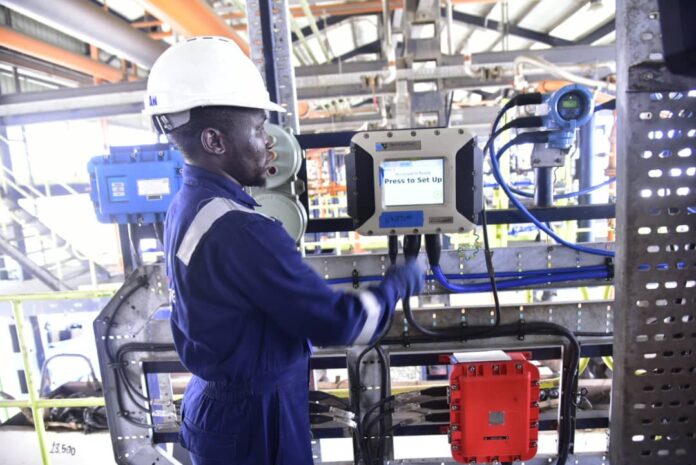The ongoing price war in Nigeria’s downstream oil sector took a new turn on Thursday as Dangote Petroleum Refinery reduced its petrol loading cost from N825 per litre to N815 per litre. This move is expected to intensify the ongoing competition in the fuel market, with marketers responding to the price change by bypassing private depot owners and sourcing their products directly from the refinery.
This reduction, which came quietly without much public announcement, is seen as a strategic move by the Dangote Refinery to maintain its market share amidst falling fuel prices and growing competition. With this adjustment, the cost of petrol sourced from Dangote Refinery is expected to have a ripple effect on other depot owners, who may follow suit in a bid to remain competitive.
The N10 per litre price cut was welcomed by oil marketers who, according to sources, immediately shifted their focus to sourcing directly from the Dangote Refinery, bypassing private depot owners. This shift in purchasing behavior suggests that the refinery’s new pricing structure has given it an edge in the market, at least in the short term.
“This new pricing structure will likely force other private depots to reduce their prices to stay competitive. The market will have no choice but to follow this lead,” said an anonymous marketer who confirmed the price reduction to our correspondent.
This new price reduction by Dangote is seen as a strategic move to stay ahead of the competition, especially considering that the landing cost of imported petrol had recently dropped. On Tuesday, The PUNCH reported that the landing cost of petrol had decreased to N774.72 per litre. This drop in import costs had created expectations that retail prices could also decrease, potentially bringing prices closer to N800 per litre.
The reduction in imported petrol prices, particularly from the cost of landing imported fuel in the country, is an important factor influencing the market dynamics. Dealers noted that the N774.72 per litre landing cost, which includes various expenses like shipping, import duties, and exchange rates, marked a significant reduction of N50.28 from the N825 per litre at Dangote’s loading gantry.
Industry experts believe that the drop in landing costs could push the price of imported products even lower. As a result, this has added fuel to the ongoing price war, with many marketers favoring cheaper imported products over those from the Dangote Refinery, which had initially been priced higher due to the refinery’s earlier strategy.
“We can expect the price of petrol to continue falling if the downward trend in the price of crude oil continues. The price might even dip to around N800 per litre, which would be a welcome relief for Nigerians,” said Chief Ukadike Chinedu, National Publicity Secretary of the Independent Petroleum Marketers Association of Nigeria (IPMAN).
In response to the growing competition, Dangote Refinery, which has a capacity of 650,000 barrels per day, made a strategic decision to cut its petrol price to N815 per litre. This price change came despite the earlier report from marketers indicating that the landing cost of imported petrol had already become more affordable.
However, after factoring in the N10 levy charged by the Nigerian Midstream and Downstream Petroleum Regulatory Authority (NMDPRA), the final price at the Dangote loading gantry now stands at N825 per litre, which is still lower than previous pricing.
The price drop from Dangote is likely to force other private depot owners to adjust their pricing strategies. Indeed, some depots have already reduced their prices to align with the new ex-depot prices from the refinery.
According to sources, some private depots in Lagos have made similar price reductions. Depots like AA RANO and MENJ have kept their prices at N830 per litre, while Bovas depot adjusted its price to N826 per litre. WOSBAB and AITEO depots also made price changes, with WOSBAB setting its price at N831 per litre and AITEO reducing its price to N827 from N832 earlier in the week. Other depots, including Integrated and RAINOIL, have made slight adjustments as well.
Despite the changes in prices at private depots, the price from Dangote Refinery remains the lowest in the market, which has further increased competition in the sector.
The ongoing price changes reflect the effects of deregulation in the Nigerian oil sector, which has allowed market forces to determine fuel prices. While the deregulation policy aims to create a competitive market and lower prices for consumers, it has also resulted in price volatility as different stakeholders attempt to secure a larger share of the market.
“The beauty of deregulation is that it allows market forces to dictate the prices. Dangote Refinery, with its massive capacity, is doing everything it can to maintain its market share. They are not going to let any external force like imported fuel take their share without a fight,” said Ukadike Chinedu of IPMAN.
He added that Dangote’s decision to reduce prices may have been forced by the market dynamics created by the cheaper imported fuel, and the refinery’s large supply capacity gives it the advantage to control market prices.
At the same time, the landing cost of petrol has continued to fluctuate. As of the latest reports, the landing cost of petrol had risen to N803.35 per litre, up from N774.72 earlier in the week. Despite this increase, the new cost is still lower than the price offered by Dangote Refinery at its loading gantry.
The landing cost of petrol includes several factors, including the cost of crude oil, shipping, import duties, and the exchange rate. Therefore, any further reduction in the global price of crude oil could lead to an even lower landing cost, which may further reduce the price at the pump. However, private depot owners and marketers are also expected to adjust their prices downward in response to competition from Dangote.

